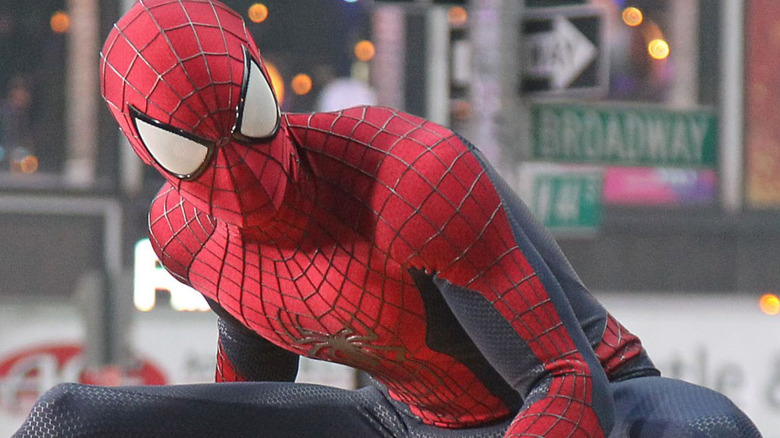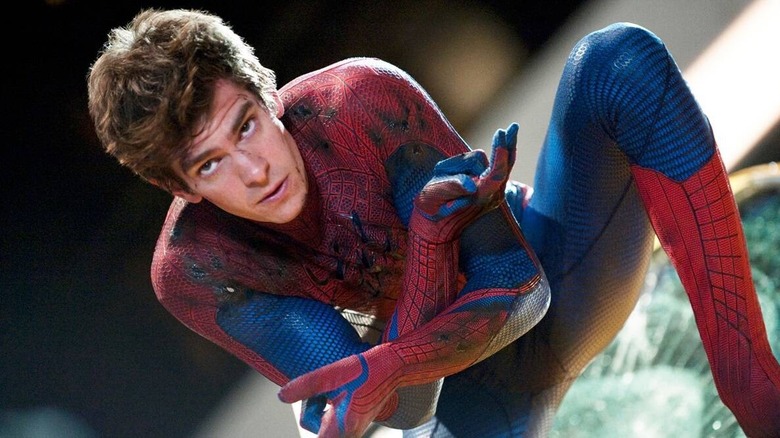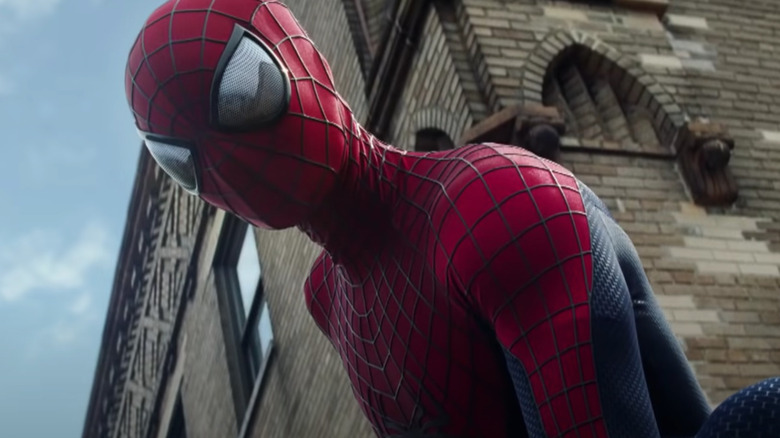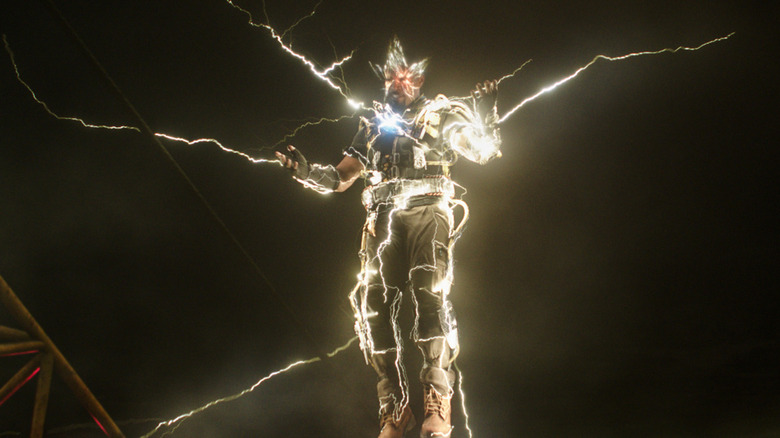How Spider-Man: No Way Home Redeems The Amazing Spider-Man Movies
As far superhero film history goes, the character of Peter Parker/Spider-Man has had a truly complicated history on the silver screen. The initial Sam Raimi films boast a great Peter Parker in Tobey Maguire alongside some fantastic villains, and frankly the first two movies are exceptional. And then the third film happened — a misguided adaptation of fan-favorite storylines (like Spidey's symbiote suit and Venom's origins) if ever there was one.
The subsequent reboot into "The Amazing Spider-Man" and its sequel were full of hit-and-miss ideas and shaky execution, which led to Sony dropping it after the second film. The unfortunate casualty in this was Andrew Garfield's interpretation of Peter Parker, one that had stunning depth and nailed the web-slinger's characteristic snark. Leaving his series behind meant we'd never see the payoff for some of the Sinister Six threads they introduced, nor would we have any idea what was to become of many people's favorite cinematic Spidey (me included).
With Tom Holland's introduction as the Peter Parker of the MCU, we've seen a lot more of the web-slinger from his own film trilogy (from "Spider-Man: Homecoming" though "Spider-Man: No Way Home") and in major team-up films like "Captain America: Civil War" and the latter Avengers' films. The multiversal exploits of "Spider-Man: No Way Home" will do much more than wrap up Holland's "Home" trilogy, however, by pulling in both prior cinematic Spider-Men, Maguire and Garfield, as well as a host of their most famous villains. As a result, "Spider-Man: No Way Home" will redeem not only the various series' unfortunate villains, but also the unfairly maligned and unfinished "The Amazing Spider-Man" films as well.
Warning: spoilers for "Spider-Man: No Way Home" and the "Amazing Spider-Man" movies follow.
Andrew Garfield Gets to Be Amazing Again
Along with a truly great Gwen Stacy performance by Emma Stone, the other thing critics tended to agree on regarding the "Amazing" series' high points was the performance by Andrew Garfield. His Peter Parker suffered real loss, stunning revelations about his parents, and the death of his love, Gwen Stacy, in a tragic (and famous) scene sent Peter spiraling into a pit of rage and guilt. In all of these moments, Andrew Garfield's emotionally complex performance was incredible ... his heart broke and it broke ours, too. Add to it that he had perhaps the best Spider-Man take of the three excellent actors, perfectly capturing the hero's trademark wit — but sadly, his stunning performance was stuffed into a pair of bad films. What's even more tragic is that the second film's reception as a haphazard and over-stuffed sequel blew his chance to have a properly finished character arc and send-off. Understandably, the ordeal hurt Andrew Garfield ... in a Guardian interview he described it thus:
I went from being a naïve boy to growing up. How could I ever imagine that it was going to be a pure experience? There are millions of dollars at stake and that's what guides the ship. It was a big awakening and it hurt."
With his return in "Spider-Man: No Way Home," Garfield gets another chance at showing just how powerful his turn as Parker is while wrapping up some unfinished business for his character.
Garfield's Peter Parker is the first multiversal Spider-Man to debut in the film, waltzing in with the same likable charm he showed in his "Amazing" films. At first mistaken for their Peter Parker by MJ (Zendaya) and Ned (Jacob Batalon), he gets to tell the tale of what happened to his interpretation of the character in the time following his own films, and his descent into anger and brutality before coming out on the other side. While he couches it in a jokey attitude and vague references to not having time for the "Peter Parker stuff," it's clear that Garfield's Peter Parker has not defeated his demons yet.
Completing the Threads of Spider-Man's Journey ... Er, Web
Beyond merely detaching his performance from the husks of his "Amazing Spider-Man" films, Garfield's appearance in "No Way Home" honors his character by wrapping up his character's arc in a way that couldn't happen once his duology was dropped. Garfield's Spider-Man suffered loss after loss after loss, and we never were able to see what became of his character after having so much tragedy and hardship. This is a Spider-Man that never had the mentorship (or money) of a Tony Stark and his unlimited bank account, nor the time travel magic of Infinity Stones or a Doctor Strange. When everything's at risk, everything is at risk, and when he loses it all, he indeed loses all of it. This is why it's so refreshing that his character arc gets closure in "No Way Home."
In the film, we find out that following the heartbreaking loss of Gwen Stacy he became a much more violent hero in his grief. While this may have lasted long enough to give Peter regrets, we discover he did ultimately come out on the other side a changed man. And when the MCU's MJ falls from the top of the Statue of Liberty (complete with Captain America shield) in the middle of the film's epic battle, and Holland's Peter can't catch her, Garfield's Spidey manages to safely catch her and bring her to the ground in a stunning act of retribution that we can really feel. In the moment after he catches her, Garfield just stands there holding her ... awash with wordless emotional gravitas — he didn't fail this time. He caught her. He did good.
It's an act that emotionally lands, and it gives some degree of closure to what is certainly his Peter's biggest regret and trauma.
The Villains, Especially Electro, Get Upgraded Arcs
Beyond Garfield and his Spider-Man, the multiversal mayhem of "No Way Home" also allows characters from "The Amazing Spider-Man" franchise to have another day in the rhetorical sun. In doing so, it improves their characters and completes their arcs in ways that are more satisfying than could be resolved in an unfinished series. The Lizard remains relatively unchanged relative to his "The Amazing Spider-Man" fate. At the end of that film, The Lizard's plan to turn New York into Lizard-human hybrids is foiled by the release of an antidote, and at the end of the film a cured (and reformed) Dr. Curt Connors saves Spider-Man's life before being taken into custody. "No Way Home" begins with a Lizard pulled from a time where the antidote hadn't been administered (either before his final cure or, like the comics, at another time when he transforms again into The Lizard — it's really an on-again-off-again, will-he-won't-he sort of thing with that green gent).
The biggest changes occurred with the energetic reconstitution of Max Dillon's Electro (Jamie Foxx), who emerged in an energetic field looking entirely different from his "Amazing Spider-Man 2" design due to vaguely explained reasons (along the lines of "something-something-energy's-different-something-something). Gone is his journey from a mild-mannered bad-combover scientist to an electric Blue Meanie, and instead Max emerges as a decidedly more handsome Jamie Foxx variant who remains so while charged up (and more powerful to boot). For "No Way Home," both the standard Max and his Electric Boogaloo-charged form are vast improvements over the original design, and in Max's final moments as a cured individual he acknowledges Spider-Man's positive role of taking care of the poor and desperate. It's a welcome exhibition of a Max who is back to normal (and it allows him to drop a subtle, charming Miles Morales reference).
In returning the pair to their restored selves (in The Lizard's case, for a second time) it clearly wraps their characters' arcs and echoes the conclusions of both "Amazing Spider-Man" movies in the most positive of ways, finally giving the series the closure it never had (and, perhaps ironically, the Sinister Six they tried to but failed to build to). The film allows Garfield's Peter Parker to restore the humanity of two of his central villains and resolve that unfinished business prior to his return to his home dimension. All combined, it's a masterful wrap-up of his arc that still leaves open further adventures (if Sony ever wanted to reactivate the character).
"Spider-Man: No Way Home" is currently playing in theaters.



